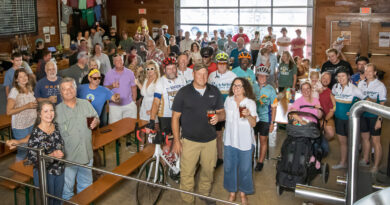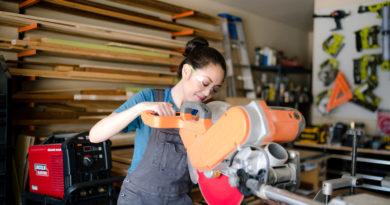Forging Relationships
Denise Ayers connects students with business partners at Temple CTE
By Fred Afflerbach | Photos Chris Hernandez and courtesy of Temple ISD

at Temple High School.
Rather than a traditional classroom with four walls, desks and a teacher lecturing, Temple High School senior Kayleb Grant is earning credit toward graduation at the Scott & White Hospital emergency room. During one particular work shift, paramedics rolled in the victim of a recent automobile accident suffering a fractured tibia, a fibula broken in two places, and wearing a tourniquet to stop the bleeding. Grant says this type experience, although rather harrowing at first, is one reason why he’s enrolled in the Career and Technical Education program at Temple High.
“There’s a lot of people who do not have this opportunity,” Grant said. “It’s put me ahead of a lot of people who are into their 30s. A lot of other people in the field say they wish they would’ve done this and they would’ve been better off earlier.”
Grant is enrolled in the Health Science career cluster, one of 13 different choices available to Temple ISD students. He’s already CPR certified and plans to attend Temple College where he will work toward a career as a paramedic and firefighter.
Back at Temple High School, CTE director Denise Ayers says a team of instructors, administrators and business partners are busy building bridges to the future while shattering stereotypes. Career and technical education, she says, is not an easy alternative to the traditional academic pathway to a diploma. It’s a rigorous, challenging and rewarding opportunity for students who don’t fit into traditional academic molds. Ayers said that the CTE model answers the age-old question that every generation of disgruntled students ask: “Why do I have to learn this?”
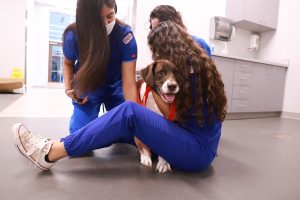
“We can have knowledge, but if we don’t know what to do with that knowledge then it’s just kind of rolling around in our head. When we give students the opportunity to apply that knowledge, we’re preparing them for life after high school and we’re setting them up for success. I think that’s one of the reasons that career and technical education is becoming more respected. People are realizing that not everybody needs to go to college to be a doctor, or a lawyer, or even a teacher,” Ayers said. “All work is respectable work. Every individual has a talent to give. We just need to be able to let that talent shine.”
In fall 2020, Temple Independent School District reported that 86% of Temple High School students took at least one CTE course. Students can select from a menu of 79 different courses, from audio visual to business and finance, to agriculture, to law. And two middle schools in Temple ISD, Bonham and Lamar, have 43% of eighth graders participating in CTE. According to the U.S. Department of Education, eight years after expected graduation, students enrolled in CTE earned higher median annual incomes than students who did not.
In 2018, the Temple CTE program cut the ribbon on a state-of-the-art, 113,000-square-foot facility with an adjacent, remodeled 20,000-square-foot automotive technology center. On a recent spring afternoon, automotive students were restoring and repairing vehicles of various ages and styles: a ’55 Chevrolet, a heavy-duty Ford work truck, and a Lexus sedan.
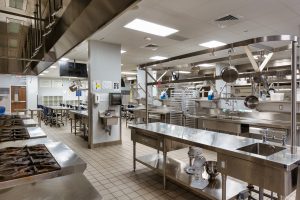
Back in the main building, culinary students operate a coffee shop, a café, and a kitchen worthy of a “Top Chef” episode. Upstairs in the health sciences wing, with mannequins occupying mock hospital beds, a visitor could think they just walked into a health clinic or an emergency room. And students in the logistics and manufacturing facility, and the architecture and construction rooms, use modern, computer-assisted machinery to build cabinets and sheet metal products.
At least two dozen local businesses and institutions have contributed to the CTE program’s success. Students often leave campus and work on-site at manufacturing or healthcare facilities. And some businesses have matched contributions for tools and high-tech machinery. “One of the greatest strengths of our career and technical programs is our business partners,” Ayers said. “And I think that is where I’ve seen it grow the most. I really believe in the value of connecting education to business. Our job is to prepare them for life after high school and we do that best through collaboration.”

One 2019 Temple High graduate of the law career pathway, Jakayla Hollie, was a certified 911 dispatcher upon graduation. She’s now a sophomore studying law at Texas Southern University in Houston.
While a student at Temple High, local judges would sometimes stand in as guest speakers. “For anyone who wants to be in criminal justice, they have so many different classes and so many different levels,” Hollie said. “We had one class where we were doing crime scenes, and another class where we were going outside and passing out parking tickets. It’s really just fun. I had more law classes than regular classes. With the teachers I had, they helped us every step of the way.”
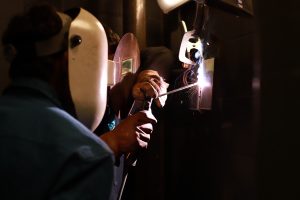
Isaac Salinas, a junior studying architecture and building, has been in the CTE program since his freshman year. He recently helped build an obstacle course for Temple Police Academy. And he toured the annual Parade of Homes, held by the Temple Area Builders Association. “It was a really good experience,” Salinas said. “We got to see more in depth how people build houses.”
A few years ago, while visiting the automotive tech facility, Ayers heard a passing car screech. “The brakes made a horrendous sound, which obviously meant they needed a brake job. A student said they need to remember Newton’s law of motion, which says that when something’s in motion it’s going to continue until something is there to make it stop. That statement from the student gave such validity to the science that was learned in a core classroom. That’s what it’s all about.”
Students enrolled in Edwards Academy in Temple ISD are also eligible to take CTE courses.



